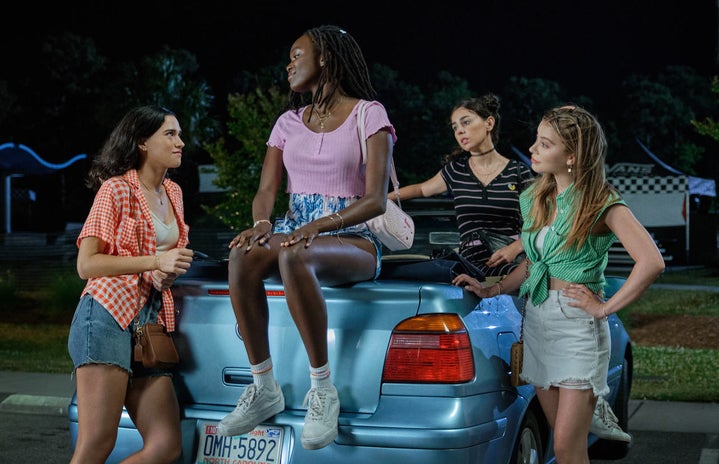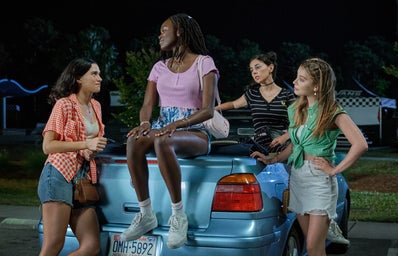The last few years of fear, trouble, and uncertainty have brought many fashion trends and teenage-based media to the forefront of our culture. The common thread between them all? Nostalgia.
Recent high school shows and movies have been gaining popularity among Gen Z college students, like Along for the Ride and The Summer I Turned Pretty, both of which are adaptations of YA novels Gen Z grew up reading. But nostalgic media has been popular among millennials, Gen Z, and “Zillennials” for years. Whether you grew up watching High School Musical and Camp Rock, or are now catching up on reboots and spin-off series of old favorites, the feeling of nostalgia probably runs deep in your bones.
Being a self-proclaimed Zillennial myself, I know the feeling of nostalgia all too well. I never consciously connected it to the media I consumed, though. Even when I binged Hannah Montana with feelings of both joy and sadness, or watched Gilmore Girls for the third time just for the comfort it brings me, I never thought of it as watching a piece of “nostalgic media.” I just enjoyed the trip down memory lane and the way it feels like a warm blanket on a cold day.
But why is nostalgic high school media so popular? I spoke with a mental health conselor to find out why we gravitate towards this media and whether it’s heathy that we do.
What is nostalgic media?
So, what is nostalgic media? Dr. Joanne Frederick, a Washington, D.C. Licensed Mental Counselor, defines nostalgia as “a yearning for your past, often when times were happier and more carefree.” Dr. Frederick adds that nostalgic media “can be anything we consume that reminds us of a time we miss or enjoy.”
The mediums that nostalgic media can live under are endless. Nostalgic media can be in the form of a book (hello, Sarah Dessen and Along for the Ride), a movie (any Netflix rom-com or coming-of-age story, like their book-to-movie adaptations of Along for the Ride, Dumplin’, To All the Boys I’ve Loved Before, and Love & Gelato), a video game, or a YouTube video. This media could even be in the form of a song or music video you listened to in high school.
Taking time to reflect on our own memories and coping with times of uncertainty.
For a lot of students and young adults, the world is so fast-paced that we barely have any time to enjoy what’s happening in the moment. It’s class after class, event after event, and then work day after work day. There’s little time to just stop and smell the roses, as we used to say. The creation of nostalgic media has given us the opportunity to flashback into these times we remember so fondly.
“Unfortunately,” Dr. Frederick tells Her Campus, “we cannot relive those memories, but watching nostalgic media allows us to visualize the memories we once created.”
Sometimes, though, reminiscing on those memories causes more harm than good.
According to Harley Therapy Counseling Blog, from UK-based Harley Therapy Platform, you need to look at how nostalgia makes you feel. If you’re “constantly being caught up in nostalgia that leaves you feel low,” you should look into it, because it could be a sign of other problems.
But, for most, it brings comfort and even helps cope with unprecedented times.
When the COVID-19 pandemic started, there weren’t many things that we were able to do. There were no dinner meet-ups, parties, concerts, or even a walk in the part. People were let go from their jobs, families couldn’t see each other, and students coudn’t go back to school. Nothing was moving and yet time kept marching on. So, to cope, a lot of people turned to streaming platforms and the media on them.
Why is this?
“During times of stress, uncertainty, and difficulty,” Dr. Frederick says, “consuming nostalgic media often increases.” She adds that “nostalgic media is equivalent to somebody you love giving you a hug, and you feel calm.”
During the peak of COVID-19, there was an increase in streaming numbers. People were turning to streaming platforms to find entertainment when it felt like the world was falling apart. And, two years into it, streaming platforms are continuing to grow their numbers.
When you watch nostalgic media, you’re able to disconnect from your current reality and your mind is flooded with the positive memories of your past. Nostalgic media allows us to feel connected to what we experienced, or even didn’t get to experience, in high school or college.
Do you ever daydream about things you wished you could’ve experienced in high school or college but didn’t? Nostalgic media allows us the opportunity to live a different life, even if the character is vastly different from us, by being able to identify with the smallest traits that character possesses.
Not many people get to have three guys fighting over them, but in The Summer I Turned Pretty viewers can relate to Belly’s insecurities and journey navigating growing up. And, in shows like Gilmore Girls, you probably don’t know what it’s like to attend a school like Chilton, but I’m almost certain you know what it’s like to worry about grades and impressing the people around you.
While those pieces of nostalgic media may make you a little sad for the past, for most consumers it does usually spark a little joy and comfort. But don’t feel bad if you absolutely hate nostalgic media and won’t go near it; for some, high school and college just weren’t all that.
Was the past really that great?
Are we romanticizing the past? According to Ally, 22, we absolutely are.
“I have an interesting story because my dad passed of cancer in 2018,” Ally, who attends Southern Methodist University in Dallas Texas, tells Her Campus. This was just a few months after she graduated high school. “So I constantly find myself romanticizing every part of high school and even trying to recreate that feeling of safety in my life using those movies and TV shows I watched with him.”
Ally adds that she knows she had rough times in high school, but it was a simpler time where she wasn’t dealing with grief or finances.
Even the professionals would agree we have a tendency to romanticize the things that happened to us previously.
“Whether it’s relationships we had or could’ve had, our old friendships, or even those opportunities we never took or weren’t offered,” Dr. Frederick says, “these groups romanticize high school as a time of new experiences.”
Though many of us could probably agree that high school included some of the worst times of our educational career, we may also remember more of the best times than we do the worst. The memories of all-nighters for an exam are replaced by an early-morning graduation breakfast. Memories of losing some of your best friends are replaced by memories with new ones.
Participating and consuming pieces of nostalgic media gives us an opportunity to refocus the memories we have of our past and find the joy in it. Even if you don’t have super joyful memories of high school and college, you may also find peace in the knowing. As an adult, things are so up in the air that even the nostalgia of a routine can bring some comfort.
Maybe it’s not that deep.
Research and expert opinions aside, maybe it’s true that these pieces of nostalgic media just bring us comfort. Movies like Along for the Ride may, in fact, let us romanticize parts of teenagehood that we didn’t get to participate in (like dating, or going on spontaneous adventures with friends), but it also brings back things we did enjoy. I own about eight books by Sarah Dessen and she was my favorite author for the longest time; when she announced this book-to-movie adaptation, I was excited for the chance to see one of my favorite books on the big screen and I know I wasn’t alone.
“Nostalgia is good for us,” Ally says. “I used to be hard on myself for seeking out that type of media all the time, but now I don’t see the problem with needing a little comfort.”
No matter what your opinion on nostalgic media is, there’s no denying that it’s a popular form of media right now. When you scroll through any streaming service you’re going to find movies and TV shows that are replaying our teenage years and wishes. You can even find people on Twitter begging for streaming services to put certain shows online.
With the world the way it is right now, sometimes we just need a moment to relive parts of our lives that we didn’t fully have to stress about.


